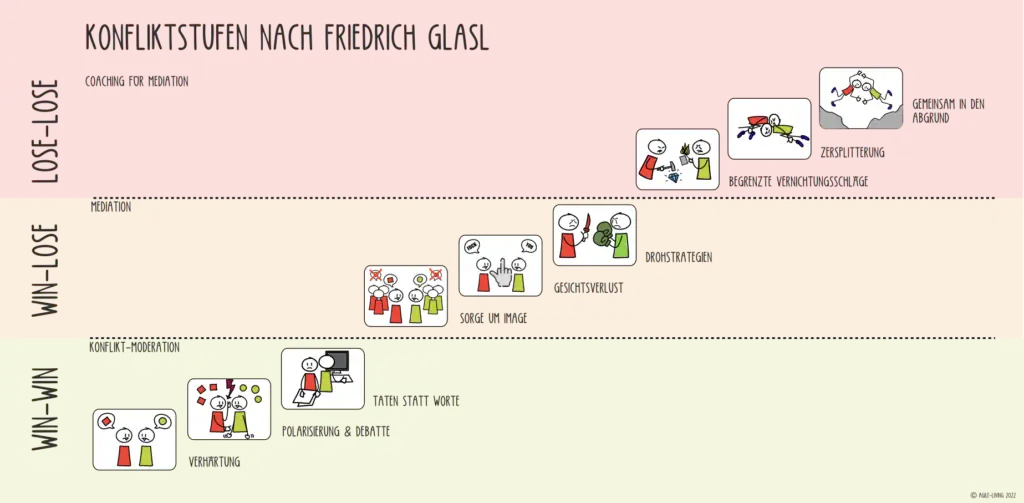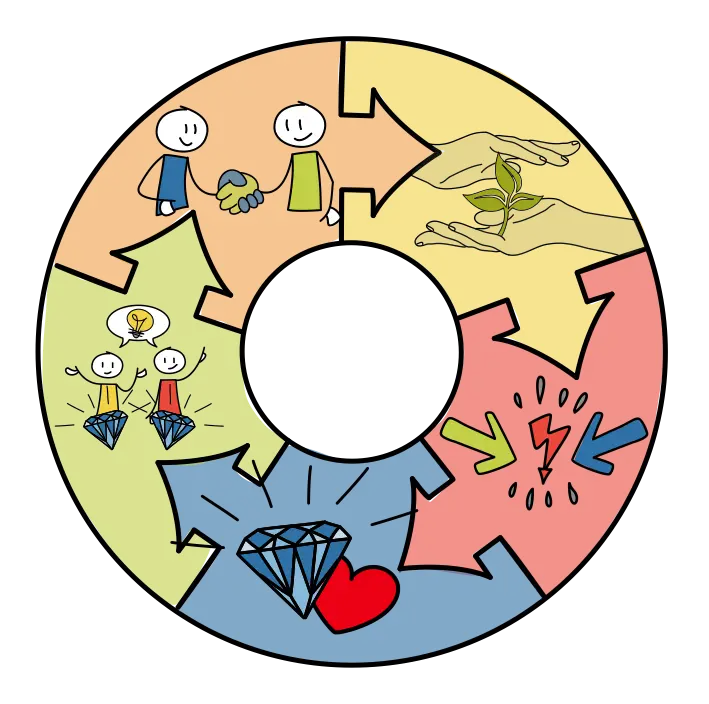
(Marshall B. Rosenberg)
Open and hidden conflicts block the success of projects and cost time and money. The individual actors often see themselves in the role of victims who can only react but cannot change anything themselves. The others are to blame, the project manager, the client, the software, the system, the universe.
With our training living Conflict we deepen the knowledge and skills of non-violent communication. In intensive small group work we practise the journey “from conflict to dialogue”. Prerequisite for this training is a minimum 2-day introductory seminar on Nonviolent Communication from us or another provider.
All training sessions can be conducted both live and remotely.
In a remote setting, we offer many opportunities and examples of remote collaboration in teams. This supports with additional know-how for remote-first work.

Friedrich Glasl’s conflict levels help to identify the conflict level.
Furthermore, the stages are good indicators for designing the next steps.
In stages 1-3, a conflict can be moderated well.
For levels 4-6, mediation is recommended.
For stages 7-9, other support is needed so that mediation can be carried out.
Here all questions about facilitation are clarified, such as confidentiality, impartiality, duty of peace, rules of communication, etc.
All participants describe their view of the conflict. The facilitator asks questions of understanding while the other conflict partners remain silent. At the end of the phase, the participants decide which topic to work with first.
Here the “good reasons” and the needs behind certain patterns of behaviour are explored. In the process, the conflict partners are slowly guided back into conversation and mutual understanding.

In this phase, options for action are explored which are jointly decided by the conflict partners and are intended to help rebuild lost trust in joint solutions.
The conflict partners agree on measures and experiments that they would like to try out until the next meeting in order to overcome the conflict step by step.
Conflict behaviour, dealing with conflicts. Conflict types
Recognising and determining the stage of a real conflict. Possibilities and limits of one’s own actions.
The 5 phases of conflict moderation, which is possible without external moderation.
The 4 steps of non-violent communication as the basis for a needs-orientated exchange.
The training includes both live and remote two working days.
We start at 10am on the first day and work until 6pm.
On the second day we work from 09-17 hrs
For in-house training, the premises including catering, if necessary, are organised and provided by the client.
For online trainings we work with Zoom and Miro.
We arrange dates on request.
We will probably train with two trainers and possibly with an assistant. The number of participants can vary live from 12 to max. 16 participants.
In online trainings we can increase the number of participants to 25.
Our fee is calculated from our flat participant fee plus VAT.
In live training sessions, the participants contribute their experiences on the topic and can try them out directly after short impulse lectures in subsequent training units.
In remote settings, participants can also contribute their experiences on the topic and, after short impulse lectures, directly test them in subsequent training sessions in breakout rooms.
We offer regular reflection sessions so that you can integrate what you have learned into your everyday life in the best possible way.
We work in small groups, plenary sessions and in pairs and look at the principles behind the agile way of working.
copyright agile-living ©2021
+49 179 5122527